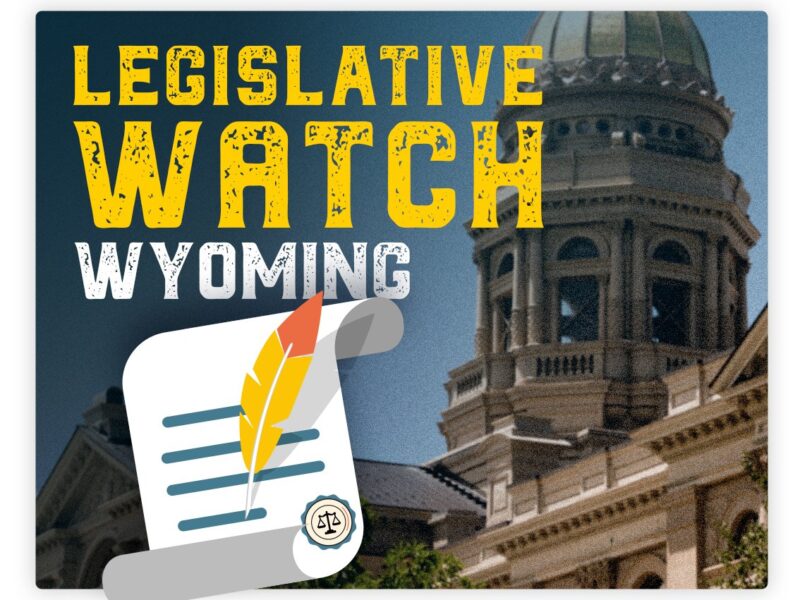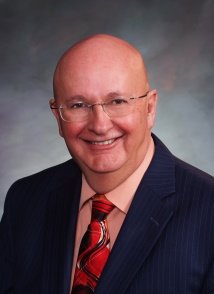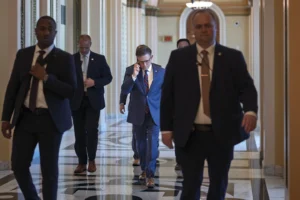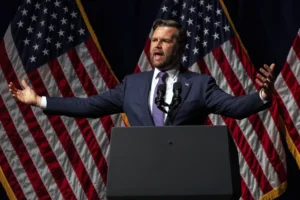LEGISLATIVE WATCH WYOMING: Bill Banning Gender-Affirming Care for Wyoming Youth Clears Senate Committee
The measure would criminalize medical interventions for youth questioning their gender identity with up to 10 years of jail time
- Published In: Politics
- Last Updated: Jan 28, 2023

By Jacob Gardenswartz
Special to the Wyoming Truth
Lawmakers on the Wyoming Senate Labor, Health and Social Services committee voted 3–2 on Friday to advance a proposal which would criminalize providing gender-affirming care to children under 18 as felony child abuse, while doctors and mental health professionals throughout the state decried what they saw as fearmongering around a nonissue.
Introduced by Senator Charles Scott (R-Casper), Senate File 111 would make it a felony crime punishable by up to 10 years in jail to provide any “procedure, drug, [or] other agent” which “intentionally or knowingly change[s] the sex” of a child under 18, whether or not the care was delivered with parental consent.

“The action we’re talking about here is criminal and not healthcare,” Scott claimed in Friday’s hearing. “What’s happening is that people are preying on young adolescents that are having that kind of confusion, and persuading them that the way to solve it is to get their sex changed to the other sex. And that has terrible consequences.”
But numerous doctors, mental health professionals and researchers disagreed. In testimony before the committee, they noted that no one is currently performing sex change surgeries on children in Wyoming but instead abiding by accepted standards of care for youth with gender dysphoria and other concerns about gender expression. Any medical interventions which are provided — drugs like puberty blockers or hormone therapies — are given after extensive therapy and are fully reversible, the officials said.
“This is not taken lightly. This isn’t a journey, anybody really wants to go on,” testified Dr. Robert Prentice, a retired pediatrician who practiced for nearly 50 years in Cheyenne.
“As a pediatrician, thinking that I might be the one that goes to jail for 10 years for doing something that I think is within the realm of medical care and appropriate, frightens the heck out of me.”
A solution without a problem?
Good data around sexuality and gender identity is hard to come by, especially in a rural state such as Wyoming. But according to the few figures that do exist, the number of transgender and gender nonconforming youth is quite low; fewer than 200 students identify as such, according to a June, 2022, estimate from the University of California, Los Angeles.
Indeed, the number of transgender adults in the state remains relatively low as well, and as such access to trans-affirming care is quite limited for that group too.
“The amount of accessible, trans-affirming care within the state is limited for adults,” Dr. Jennifer Tabler, a medical sociologist at the University of Wyoming who studies mental health disparities in LGBTQ youth, told the Wyoming Truth. “Many of the adults within our state go to Colorado for various transforming care… So if you’re talking about even younger, those resources are going to be so incredibly limited.”
“We’re essentially constructing policy around an issue that isn’t an issue within our state, or even nationally,” Tabler added.
Physicians stressed that the little gender-affirming care which is provided in Wyoming is entirely nonsurgical. “There is currently no gender affirming surgery happening in the state of Wyoming, and is definitely not happening on children,” Dr. Rebecca Franklund, an OB/GYN in Sheridan, told the committee.

Nonetheless, some lawmakers pressed forward with claims that such procedures were being pushed on children, insisting also that many youth grew up to regret them.
In reality, the limited peer-reviewed studies which exist show the exact opposite: so called de-transitions or re-transitions are “infrequent,” researchers wrote in a study published in the American Academy of Pediatrics last year which examined the status of transgender youth five years after social transition. Moreover, the few youth who did choose to return to their identities pre-transition often did so due to societal pressure that made living as a transgender person difficult, not because of a change of heart regarding their gender identity.
“The ones that do de-transition, it’s a result of direct pressure from friends and family, because of the direct stigma and hostility that they receive in their lives,” Tabler explained.
Concerns about mental health impacts
Physicians and mental health experts testifying before the committee warned that criminalizing gender affirming care could have dire impacts on the mental health of transgender youth, who already report disproportionately high rates of depression and suicidality.
If the goal is to support youth and reduce suicide, “we won’t accomplish this by sending messages to physicians and to parents that they will be locked up for doing the right thing for children,” testified Dr. Andrew Rose, a pediatrician at the Cheyenne Children’s Clinic and president of the Wyoming Academy of Pediatrics.
In an interview with the Wyoming Truth, Chance, a transgender man who works as a bus driver in Laramie, was blunt in his analysis about the impact the measure would have on the state: “The suicide rate will go up,” he said. “If it’s not high right now, oh buddy, I got some bad news for you: it’s gonna be high in a minute.”
Chance asked not to be identified by his last name to protect his personal and professional safety; he said that though he finds Laramie to be somewhat accepting, “it is still Wyoming.”
“Being transgender is not a choice,” Chance added, explaining that he first pursued transitioning around age 16 when he learned about gender identity and expression growing up in New England. He said he couldn’t understand what the purpose was behind lawmakers’ push to ban something he found so instrumental to his identity growing up.
“I don’t understand what they are so threatened by, what they are so scared of,” Chance said.
“Let doctors be doctors”
As Friday’s hearing trudged along, opponents of the bill questioned the intent behind certain exceptions in the measure. As it currently stands, sex change surgeries would be allowed for children born intersex, with multiple different types of sexual anatomy, or to treat traumatic injuries. Such procedures would be barred for those who required them due to mental health conditions, however.
“The policy isn’t really about protecting children broadly,” Tabler argued. “It’s just about legislating around fear around trans young people.
She questioned why gender-affirming care was being banned when other, permanent surgeries like nose jobs or liposuction would still be allowed to be performed on children, and suggested that the effort to regulate how parents raise their transgender youth ran afoul of other legislative policies aimed to bolster parental rights in school.
“Why in some ways are we saying that parents should have rights on one hand, but then absolutely no rights to protect their children on the other?,” she asked. “Because many parents will see providing puberty blockers, providing hormonal therapies as a way to protect the mental health of their children.”
Even some more conservative members of the Senate committee seemed to question whether the government should be regulating what procedures medical professionals should be allowed to prescribe.
“I think we need to let doctors be doctors and not criminalize people,” said Sen. Fred Baldwin (R-Kemmerer), the committee’s chairman who opposed the policy. Nonetheless, the measure passed his committee and will head to the full Wyoming Senate next week.
But regardless of if the measure makes it way into law, Chance had a message for fellow transgender people in Wyoming.
“The bravery of one will outway the cowardice of dozens,” he said. “It’s not made to be easy. But you know exactly what to do. So be brave, you can do it.”













